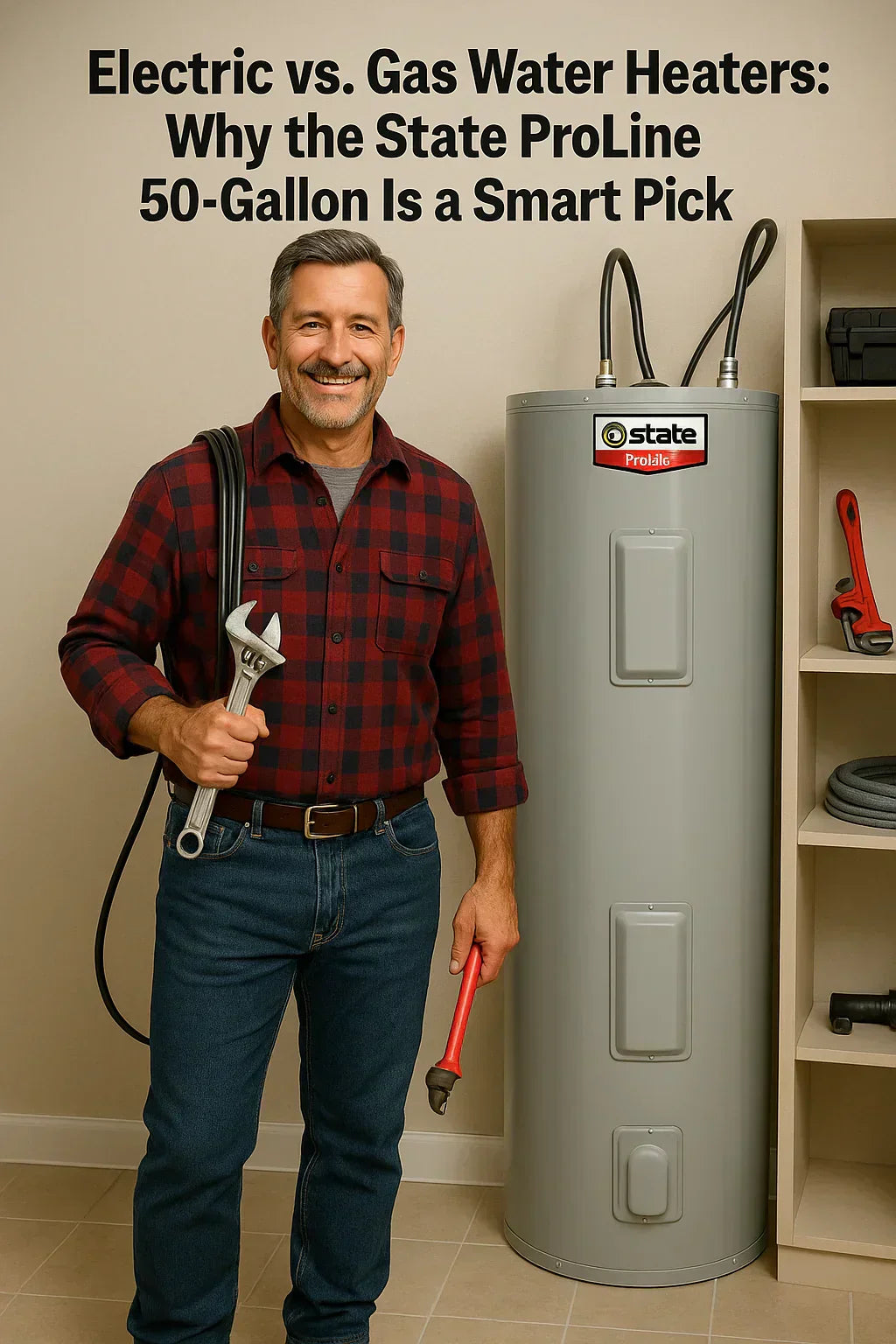Hey there—Mike Sanders here. I’ve installed my fair share of water heaters over the years, and let me tell you—choosing between electric and gas isn’t just about picking what’s cheapest. It’s about what works best for your household, budget, and peace of mind. Today, we’re diving into why the State ProLine 50-Gallon Electric Water Heater might just be the smartest pick on the market for 2025.
⚙️ 1. What’s the Real Difference Between Gas and Electric Water Heaters?
🔥 Gas Water Heaters
-
Use natural gas or propane to heat water.
-
Have a faster recovery rate due to higher BTUs.
-
Require venting, adding installation complexity.
-
More prone to combustion-related risks (carbon monoxide, gas leaks).
⚡ Electric Water Heaters
-
Use electric resistance elements (like a stovetop coil).
-
Heat water more efficiently (98%+ vs. 75-85% for gas).
-
Simpler installation—no flue or gas line.
-
Tend to be safer, quieter, and lower-maintenance.
✅ According to The U.S. Department of Energy, electric models are more efficient overall—though gas can have lower operating costs depending on local utility rates.
📊 2. The Numbers: Efficiency, Cost, and Performance
| Feature | Gas | Electric |
|---|---|---|
| Efficiency | 75–85% | 98%+ |
| Recovery Rate | Faster (high BTU) | Slower (unless 4.5kW element) |
| Install Cost | $1,500–$2,800 | $800–$1,600 |
| Energy Cost | Usually lower | Varies by region |
| Maintenance | Burner cleaning, venting | Flushing, element checks |
| Safety | CO risk, combustion | No flame, lower risk |
Sources: The Energy Professor, Checkatrade, Hot Water Talk
🧰 3. Why I Recommend the State ProLine 50-Gallon Electric
This heater isn’t just a basic tank—it’s built for performance and longevity.
🔋 Key Features
-
4.5 kW dual heating elements = faster recovery
-
Factory-installed temperature & pressure relief valve
-
Self-cleaning dip tube helps reduce sediment buildup
-
Durable glass-lined tank resists corrosion
👉 Visit the product page for full specs.
🔒 Long-Term Reliability
Unlike gas units with burners and vents that get finicky over time, this State ProLine electric model offers low maintenance with no combustion chamber to worry about.
🛠️ 4. Installation & Safety Advantages
Installing an electric water heater is:
-
Easier: No gas line, vent, or combustion exhaust.
-
Safer: No risk of carbon monoxide leaks.
-
More flexible: Can go in smaller utility closets.
Mike’s Tip: If you’ve got a newer all-electric home or your gas line is maxed out—this unit is a no-brainer.
💵 5. What About Monthly Energy Costs?
Example: 50-Gallon Electric vs. Gas
Using 64 gallons/day for a household of 4 (standard DOE model):
| Fuel | National Avg. Rate | Est. Monthly Cost |
|---|---|---|
| Gas | $1.20 per therm | $25–$35/month |
| Electric | $0.15 per kWh | $40–$60/month |
But the installation savings with electric often offset years of energy cost difference.
📘 Learn more from The Furnace Outlet's gas vs. electric breakdown
🧪 6. Recovery Rate—How Long Does It Take?
The ProLine 50-gal has a 4.5 kW element that recovers around 20-25 gallons per hour. For a 4-person home doing back-to-back showers, it holds up well.
Gas heaters do recover faster (~30-40 GPH), but with proper scheduling, electric still meets daily needs—especially if your routine is staggered.
🧼 7. Maintenance and Lifespan
Electric heaters like the State ProLine:
-
Have fewer moving parts
-
Are less likely to corrode or leak flue gases
-
Only require annual flushing and occasional element checks
Gas models require burner inspection, flue maintenance, and ignition system checks.
🧯 Safety-wise? No gas = no leaks or CO alarms needed.
🌱 8. Regulations, Rebates & Future-Proofing
DOE 2029 Mandates
Per the Department of Energy, new regulations will soon make many older gas models obsolete.
Rebates & Incentives
Electric heaters may qualify for:
-
Local utility rebates
-
Federal tax credits under the Inflation Reduction Act
-
ENERGY STAR® discounts (if UEF meets threshold)
📌 Read Kiplinger’s Tax Credit Guide
🏠 9. When Electric Is the Better Choice (Hint: Often)
Electric wins if…
✅ You don’t have gas service
✅ You want lower upfront cost
✅ You prefer a quieter, cleaner unit
✅ You’re in a newer build or remodeled home
✅ You care about long-term efficiency
Gas might win if…
🔥 You live in an area with cheap natural gas
🔥 You have multiple showers at once daily
🔥 You already have gas appliances nearby
💡 10. Mike’s Final Word
Here’s how I see it:
“If you’re like most homeowners I work with, you want a reliable, safe, and simple solution that won’t have you replacing thermocouples or vent pipes every couple years. For my money, the State ProLine 50-gallon electric water heater checks every box.”
It’s ideal for 3–5 person households, built with smart features, and won’t have you worrying about exhaust pipes or fuel interruptions.
🔗 Useful External Resources
In the next topic we will know more about: How to Install a 50-Gallon Tall Electric Water Heater: Step-by-Step Guide for DIYers







